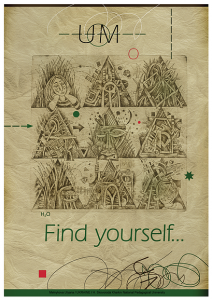Dr. Alex Barchiesi
ARA (Advanced Research Associate) at the Planetary Collegium, The I-Node, School of Art & Media, University of Plymouth

No Title (2015)
Richard Feynman said, “I think it is safe to say that no one understands Quantum Mechanics.” [1]
While I strongly admire and respect Feynman, I’d like to extend the field of the so called understanding to something that is more sensual and I’ll call “field intuition” (to conceptually refer to field theories in modern physics).
We can think a human being as a highly connected organism who extends through time and space. Human experience unceasingly involves intrinsically mental and experiential functions such as “knowing” and “feeling”, involving images, intentions, thoughts and beliefs. A continuous interface holds between mind/consciousness and brain. [Mental states follow quantum mechanics during perception and cognition of ambiguous figures. arXiv:0906.4952]
Modern quantum physics has revealed that light particles seem to know what lies ahead of them and will adjust their behavior accordingly, even though the future event is not perceived as occurred yet. [T.Young: two slits experiment]
Although we perceive time as linear and unidirectional, research continues to reveal that it is not necessarily so.
One thing that is still missing and should be taken into deeper account is all the field of sensual knowledge that recently started to find his scientific formalization in neuroscientific results. Mirror neurons allow us to grasp the minds of others by feeling, not by thinking. This is shifting the understanding of culture [G. Rizzolatti – Craighero L. The Mirror-Neuron System. Annual Rev. Neurosci. 27 (2004) 169-92.] We could speculate about a possibility to extend it to certain fields of physics and science in general.
New alter – (not necessarily altered) – spaces have been rediscovered in this new era of augmented perceptions which defies our physical intuition about how the world is supposed to work.
Most working scientists hold fast to the concept of ‘realism’ – a viewpoint according to which an external reality exists independent of observation. But quantum physics has shattered some of our cornerstone beliefs. Experiments have amply confirmed quantum predictions[An experimental test of non-local realism – arXiv:0704.2529 [quant-ph]].
Our “naive physics” is actually closest to Aristotle’s 2300-year-old theories, in which heavy objects fall faster than light ones and objects in motion ease to a stop unless you keep pushing them. Quantum mechanics may seem weird, but to Aristotle, Newton’s laws would have been just as head-spinning.
The thing that’s hard is not that the people are ignorant or not ready. It’s that they already know the answer — and it’s wrong…
To get from Aristotle to Newton, you have to be able to imagine a world without friction. “It was just incredibly difficult for classical physicists to make the leap from that worldview, which was confirmed by the things they saw in the everyday world around them, to understanding the strange implications of quantum mechanics,” [Steve M. Girvin – Yale University]
In the quantum world objects resist classical banalities as “space” and “time”. Particles are waves and waves are particles, and the act of observing seems to change the system being observed.
But what if we could develop a “field intuition” that would make this all seem as natural as an apple falling from a tree?
We can develop a new and more appropriate meaning for understanding and experiencing that I advocate and will call field intuition.
The fact that our minds ‘overevolved’ and allow us also to find beauty in sunsets and mountains, waterfalls and people and outer space, and (most bizarre of all) the atomic world among other alter spaces, is a gift that we do not(in many cases) even notice.
That we can make any progress at all in understanding quantum mechanics is surprising, that we can sensually feel the quanta could be even more surprising.
www.i-node.org






